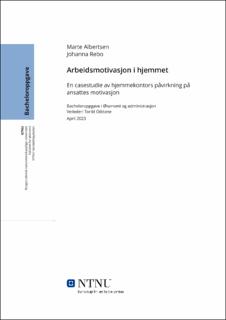| dc.contributor.advisor | Oddane, Torild | |
| dc.contributor.author | Albertsen, Marte | |
| dc.contributor.author | Rebo, Johanna | |
| dc.date.accessioned | 2023-06-15T17:20:24Z | |
| dc.date.available | 2023-06-15T17:20:24Z | |
| dc.date.issued | 2023 | |
| dc.identifier | no.ntnu:inspera:140915253:146311186 | |
| dc.identifier.uri | https://hdl.handle.net/11250/3071660 | |
| dc.description.abstract | I denne oppgaven vil vi diskutere hvordan hjemmekontor påvirker arbeidsmotivasjon. Etter nedstengingen av Norge i mars 2020, har koronapandemien vært et mye diskutert tema. For å følge de nasjonale retningslinjene som ble gitt, ble hjemmekontor et nødvendig tiltak for mange bedrifter. Når situasjonen nå kan sees litt på avstand, er det relevant å evaluere håndteringen av situasjonen være et aktuelt tema å belyse. Vi ønsket å se på sammenhengen mellom hjemmekontor og ansattes arbeidsmotivasjon, og kom fram til problemstillingen: “Hvordan har innføringen av hjemmekontor under koronapandemien påvirket ansattes arbeidsmotivasjon?” For å kunne drøfte problemstillingen har ulike motivasjonsteorier blitt benyttet. De relevante motivasjonsteoriene som har blitt brukt i denne oppgaven er Maslows behovspyramide, Herzbergs tofaktorteori og sosiale motivasjonsteorier. Teoriene har lagt grunnlaget for å beskrive ulike typer motivasjon og hvordan motivasjon kan påvirkes.
For å undersøke temaet nærmere kontaktet vi en organisasjon, heretter kalt «Organisasjon X», så relevant informasjon om ansattes opplevelser på hjemmekontor kunne innhentes. En kvalitativ spørreundersøkelse ble benyttet for å få en forståelse av hvordan ansattes motivasjon ble påvirket på hjemmekontor. Spørreundersøkelsen ga respondentene muligheten til å utdype sine erfaringer og synspunkter, som senere skulle legge grunnlaget for dybdeintervjuer. Dessverre ønsket ikke Organisasjon X å gjennomføre dybdeintervjuer fordi de ville unngå å sette ansatte i en ubehagelig situasjon. Dermed ble spørreundersøkelsen den eneste primærkilden til empirisk data.
Etter analyse og drøfting av dataene, var det tre faktorer som tydelig skilte seg ut: konsistent praksis, sosiale behov og livssituasjon. En inkonsistent praksis førte til misnøye hos flere ansatte som opplevde å bli urettferdig behandlet. Manglende daglig kontakt med kolleger gjorde at sosiale behov var poengtert av mange av respondentene. Mangelen på sosial kontakt påvirket både tilhørigheten, autonomien og kompetansen i ulik grad hos de ansatte. Etter analyse av data, var det et tydelig mønster at individuelle forskjeller i livssituasjonen til de ansatte skapte ulike behov og ønsker som burde tas hensyn til. Generelt kan en se at koronapandemien har påvirket folk i ulik grad. Ut ifra resultatene fra vår spørreundersøkelse er konklusjonen at god tilrettelegging for den enkelte være lønnsomt i det lange løp, da motivasjonen i større grad opprettholdes. | |
| dc.description.abstract | This thesis deals with the home office phenomenon and repercussions that arise from its use. After the shutdown in March 2020, the corona pandemic has been a much-discussed topic. A lot of businesses found that the use of a home office was a necessary step in order to comply with the provided national guidelines. The topic is particularly pertinent since it may be easier to evaluate how it was handled now that the scenario can be observed from a distance. We want to look at the connection between home office and employees' work motivation, and have arrived at the problem: “How has the introduction of remote work during the COVID-19 pandemic affected employees' work motivation?”
In order to be able to discuss the subject areas, many motivational theories have been applied. The relevant motivation theories that have been focused on in this context are Maslow's hierarchy of needs, Herzberg's two-factor theory and social motivation theories. The theories have set the groundwork for identifying different types of motivation and how motivation can be altered. We got in touch with a company, Organisasjon X, to get pertinent information to delve deeper into the issue. We wanted to form an indication of which factors were important, and therefore used a qualitative survey. Initially, the plan was to hold in-depth interviews, but unfortunately this could not be carried out due to decisions from the company management. The purpose of the survey was to increase the understanding of employees' experiences of the transition to a home office. We wanted to get a better insight into how work motivation and social well-being are affected by remote work and which factors are important to maintain employees motivation.
After analyzing and discussing the data, three factors clearly stood out: consistency, social needs and life situation. An inconsistent practice in some measures led to dissatisfaction among several employees, as they felt unfairly treated. Social needs were an important factor for many of the employees, as they experienced a loss of daily contact with colleagues. The lack of social contact affected the sense of belonging, autonomy, and competence in various matters among the employees. Individual differences in an employee's life situation created various needs and desires that should be taken into account. Generally, one can see that the COVID-19 pandemic and its consequences have affected people to various degrees. Based on our survey and conclusion, good adaptation for each individual will be profitable in the long run, as motivation is more likely to be maintained. | |
| dc.language | nob | |
| dc.publisher | NTNU | |
| dc.title | Arbeidsmotivasjon i hjemmet | |
| dc.type | Bachelor thesis | |
